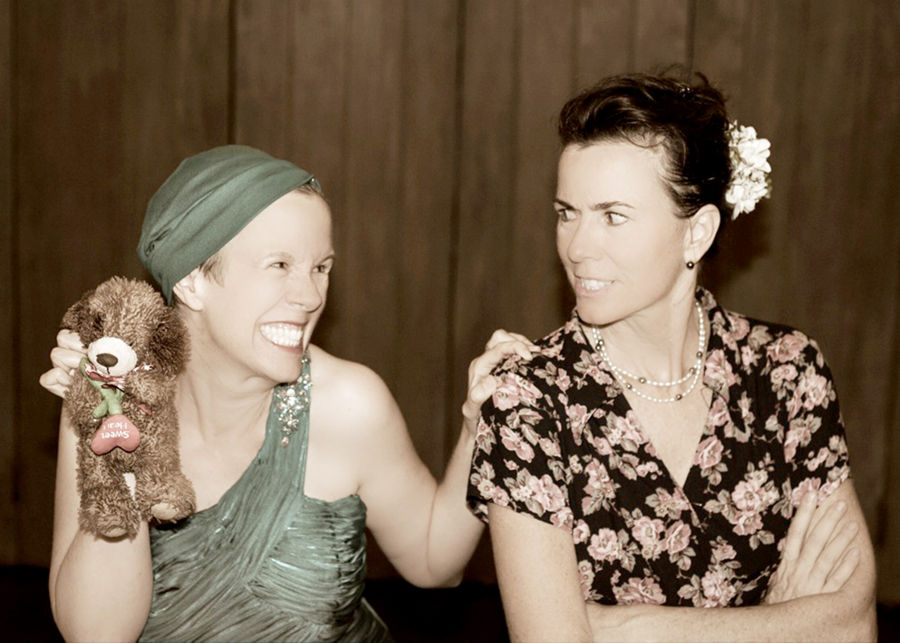Be happy with what you have because everything can change and paradise can be lost in a minute. That is the message at the heart of “Emma’s Last Dance,” a play from writer and director David Penhallow Scott, and produced by
Be happy with what you have because everything can change and paradise can be lost in a minute.
That is the message at the heart of “Emma’s Last Dance,” a play from writer and director David Penhallow Scott, and produced by Women in Theatre for three shows from 7 to 9 p.m. Friday and Saturday and from 4 to 6 p.m. Sunday at the Performing Arts Center at Kauai Community College.
The story centers on Hawaiian society on the eve of the attack on Pearl Harbor in 1941.
This second of a quartet of plays is based on one family’s migration around the Hawaiian islands. The first play, “Bonsai Darling,” was set in 1930s Kauai and produced several years ago.
“You learned that life can turn upside down in a minute,” Scott said. “That is one reason I keep using this as a theme.”
The setting is the Aiea plantation overlooking Pearl Harbor. There was a plantation manager’s home and guest cottages in a time before the hotels and a visitor industry.
Penhallow Scott is a fifth-generation kamaaina, and was just 7 years old when he witnessed the attack on Pearl Harbor. He born on Oahu and lived in the Manoa Valley with his mother and sister.
The story centers on a secret.
Emma Kealoha is portrayed by Claudia Cowden. It his her story and her secret that permeates the subplots.
Emma is a Native Hawaiian character who was created from a combination of the strong Hawaiian women whom Scott has known.
“She is wise and teaches a lot about life,” Penhallow Scott said about Emma.
The characters in the family were all born on the Kauai plantation before the husband manager is transferred to Oahu. It was typical to transfer managers around to the different islands.
Penhallow Scott was not raised on the plantations but his uncle worked for Ewa Plantation, and his cousins worked on Waialua Plantation on Oahu. He visited the home of relatives and observed the daily lives of the workers and the manager’s family.
“When I grew up there was basically no tourism,” he said. “The ships brought the tourism, and after the Second World War the boom started with G.I.s who wanted to show their families where they served during the war.”
The first two acts show a romantic Hawaii. It is before jets and hotels and the plantation life meant a lot of socializing.
“They had to make their own pleasure in those days,” he said. “The parties were very much a part of life here.”
The latter acts occur after Pearl Harbor, when the lifestyles changed overnight with martial law. There was a real fear that the Japanese were going to invade the islands and to break curfew mean you could get shot or sent to jail without a trial.
“We carried gas masks, and they built air raid shelters that essentially became pits for centipedes,” he said. “It went from an idyllic life to a life of fear.”
Nicole Cowan makes her Kauai acting debut in the role of Peggy. Her character is a troubled teen who is raised by her aunt, Eudora Whitney, the wife of the plantation manager portrayed by Lorraine Marshall.
Carol, portrayed by Emily Goldbach, ran off to become a star in Hollywood and is returning to Oahu to visit her sister with her Mexican paramour Paco, played by Bard Widmer. The two work for Warner Brothers and the roles are drying up.
Eudora wants only to survive this visit from her sister. She is counting the minutes until Carol returns to California.
Paco’s career is nearly over and he wants to marry another rich woman to support his lavish lifestyle.
Peggy wants to return to Hollywood with her mother, Carol, portrayed by Emily Goldbach. Carol wants nothing to do with her daughter.
“She doesn’t have a maternal bone in her body,” Cowan said.
The plantation manager Whit Whitney, portrayed by John Bohling, only wants peace in his work and in his home.
Miki, a Japanese plantation housemaid portrayed Kay Koike, is Eudora’s best source of support in managing the house but also her family.
“She is the most likable character,” Penhallow Scott said. “She is the one who tries to keep the family together.”
All the characters need something, he added. Their imperfections, their relationships with one another, and of the culture of the time do not make them less lovable.
Scott understands characterization is more than the script, Cowan said. He worked countless hours getting those details that help the audience appreciate a good story.
“David is an ‘actor’s director’ who knows his characters inside and out,” Cowan said. “His heart is in it as an author, but he is also able to relate the characters to us.”
The costumes by Barbara Green are beautiful period pieces, Cowan added. That, in combination with the sound and visual effects by Chris Wietser, make the story vivid and the attack surreal.
Re-enacting the eve of the attack is intense and speaks volumes about the family trying to get past something so terrible and come out on top.
“This is really just a story about a family who has skeletons in their closet,” Cowan said. “It is mainly about love.”
The remaining two plays will take the family to Maui and the Big Island for the second half of the 20th century.
Tickets are $20 in advance and $25 at the door. Info: 635-3727 or visit www.womenintheatre.org.




